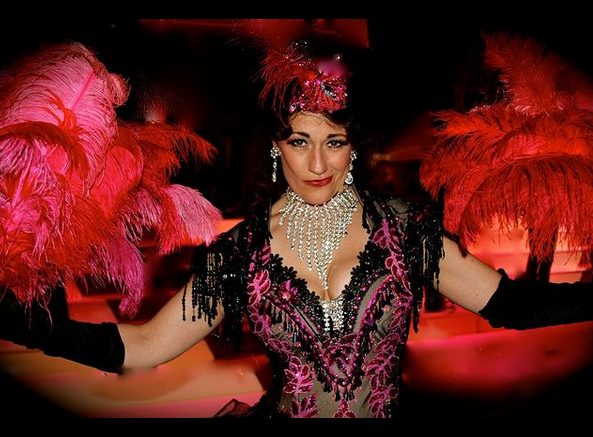 BBC News
BBC NewsBorrowing was £17.4bn last month, the second highest October figure since monthly records began in 1993.

Georgia Heneage
Reaching out on Twitter to chat to magicians from across the UK, one magician, Billy Reid, tells me he’s “all ears – or eyes, in this case…”.
It’s a taster, perhaps, of the secret treasures of virtual magic shows. I indulged in one during the second pandemic for a friend’s birthday, and found it was a great substitute for the pleasures of card-tricking, rabbit-bearing magicians I’d briefly stumbled upon at bars or parties. We sat huddled round a TV, surreptitiously sipping cocktails and clad in unnecessarily fancy dresses, while an on-screen magician beamed virtual mysteries beyond our imagining – guessing a random four-digit code I’d thought up, for instance.
I was prompted to revisit this chilling memory when I saw that the world’s first state-approved degree in magic had arisen in France a few weeks ago. Double Fond, a theatre in Paris specialising in magic, has already awarded 13 degrees over the past year and will offer 15 more in the next month. The degree includes performing before a “jury” and writing papers on the history of magic, “self-promotion” and the magic business. It involves 550 hours of lessons and 2,800 hours of homework. Though in the UK you can take courses in magic, there is no such officially-recognised degree in the dark arts – though Double Fond says they are keen to expand across the pond.
We’ve all witnessed the glittering splendour of magic through films like Now You See Me, or The Prestige. But the idea of magic as a hard-won career, which involves years of practice and trial-and-error, may be an eye-opener for some (in more ways than one). Even googling magic as a potential career brings up a first result of ‘jobs in the wizarding world’ from the official Harry Potter fandom page.
Even so, when I speak to professional magicians across the UK, I gain the strong impression that this is a serious and burgeoning career, and one which – if you play your cards right – is a fun and potentially very lucrative industry. It’s also a world which has been forced to undergo serious transformation during the pandemic. Their stories also reveal how little formal training there is available in this country.
The state of the magic arts in the UK
Billy Reid, a professional magician from Glasgow, says magic is “not taken seriously enough” as a career: “you say ‘magician’ and people think of rabbits, top hats and balloons. We’re still striving to be taken seriously as an art form.”
For this reason, Reid was self-taught: “I used to go to Blackpool with my mum and grandparents and visit this magic shop. I’d just spend hours there watching tricks and learning. My brother would even fall asleep on the floor.”
After practicing day-in-day-out, Reid went pro. But he says he’d still have welcomed a more formally-structured course and the chance to champion “a known certificate to prove your talent”, aside from being a part of the Magic Circle.
Richard Parsons, a Gloucestershire-based magician who has been practicing for over ten years and a member of the Magic Circle, also got into magic via unorthodox means.
Parsons already had a business as a therapist, and at one of his annual conferences, a friend (who was also a therapist) did some magic tricks for him. “I was instantly hooked, even though I wasn’t really into it as a kid,” says Parsons.
His friend didn’t tell him how the tricks were done, but sent a deck of cards and a book of tricks and said to show him next time they met. “Over the next couple of years,” says Parsons, “I did my job and magic as a hobby. I did tricks for people at parties, then started to get booked up for weddings and corporate events.”
One thing led to another and Parsons made the “business decision” to become a full-time magician. The volume of work built and, “because it’s one of those industries where the more you work the more work you get”, Parsons quickly climbed the ladder and he was soon auditioning for the elite Magic Circle.
It’s a lengthy and thorough application process: according to Parsons, you have to be nominated by two existing members, have an interview and an audition where you perform eight minutes of magic in front of three professionals. Once in, cards must be kept excruciatingly close to the chest. You can be reported to the ‘council for the magic circle’ and risk ‘expulsion’ if you break the magic code. “We have to sign a bit of paper saying we’re not going to reveal the tricks to Muggles. I don’t even tell my wife how this stuff is done,” he says.
Because of this Chinese-whispers process, which Parsons says is the very essence of learning magic, he is reticent that a magic degree would be a good idea. “I think it would have to be very carefully run and you’d have to know a bit of magic beforehand.”
It would also need to encompass the myriad elements of the magic profession. “You’ve got to have negotiation skills and be really good with people. You’ve also got to know how to perform and learn things like stage presence, controlling the audience, microphone technique, speaking skills and scripting skills.”
In fact, if Parsons has a golden nugget of advice for budding young magicians, it’s to just do it. “I get emails from teenagers all the time asking how to get into magic. I always say it’s great doing TikTok and YouTube in your bedroom, but if you want to do this job you need to learn how to interact with people, and the only way of doing that is to get out there and actually do it.”
But Parsons is also a huge advocate for taking the leap. Magic, as we’ve seen, is not always viewed with enough respect as a profession. “My main advice to young people entering careers is: if you’ve got a passion outside the norm, go for it. It’s possible to do something that you absolutely love.”
The changes: women and the virtual space

The rise in formal training courses for magic is not the only way in which the industry is changing; a profession seemingly reliant on the face-to-face contact (the coin behind the ear, the rabbit out of a hat), the pandemic has had a massive effect on magicians’ craft.
Richard Parsons says that if performing magic shows over Zoom was at first strange, he and others soon adapted to the virtual medium, realizing that it even broadened the scope of the tricks available to them. “You can do a lot over Zoom and get away with things that you wouldn’t be able to do in real life,” he says. “The pandemic’s enabled us to develop some new material.”
Another significant change is the introduction of women to the profession: The Magic Circle only allowed female members in the 1980s, and the industry has always been a male-dominated one. Now women are stepping out of the shadows and from the limiting role as the magician’s beautiful sidekick, and into the limelight: more and more are trying their hand at the dark craft, though like many industries we still have a fairly long way to go before the industry is weighted equally between the genders.
Like many others, Romany Romany became a magician through sheer love of a hobby. She was working for British Telecom at the same time as attending evening magic classes, and decided one day to give up her well-paid corporate job to follow her dream.
Through seventeen years of sheer “persistence” (a quality I’m told yet again is crucial to success), Romany went to Las Vegas to learn magic, married a German juggler and was soon touring the world with her shows including the prestigious Penn & Teller show in America. She was the only British woman to win the world magic award in Las Vegas and the Magic Circle Magician of the Year.
She says that though more young female magicians are rising to prominence, it’s still important to work hard to differentiate yourself from the string of male magicians. “There are so many hurdles to achieving as a woman that you have to be different. I think that’s true for almost every industry: if you want to succeed, you always have to be better.”
When Romany first became a performer, for instance, she copied the male costume – black suit, top hat- the lot. When she was a stilt walker she copied the pin-striped trousers and waistcoat. “But then I thought: actually, I want to be different.” So Romany began wearing jazzy colourful dresses in the manner of a show-girl which, she says, gave her more “creative opportunity” and marked her out from her black-clad male associates.
Yet challenges still appear in mysterious forms: when Romany began learning tricks from a book she realized that many were based around male clothing. ‘Ten ways to produce an egg out of nowhere’ was based on producing an egg from a (male) breast-pocket of a jacket. And that same special magic pocket is even “tax deductible”. But this, says Romany, forced her to think of alternative methods.
Magic connects us

Richard Jones is the only magician to have ever won Britain’s Got Talent in 2016- and his journey, like so many others, began in an unusual setting.
He joined the army, and in the first few years was travelling all over the world, with lots of time to either “sit and read”, or “learn something new.” His army associates, he says, were the “perfect audience” for him to try new tricks on, because they were honest and quick at catching him out. If he did something that didn’t impress they would come right out and say it.
“I just got more and more fascinated by the art of deception and illusion,” says Jones, “so I started getting better and better and agreeing to do bigger shows, even though I didn’t have any formal training. But I think that’s why I’m where I am today: I learned the hard way from always being under pressure.”
The pandemic has been somewhat of a spanner in the magic works for Jones – as for most. But, like Richard Parsons, he did what magicians do best: adapted. He invested in a big tech set-up in his house with cameras and lighting and a sound desk and started virtual shows, which have been immensely popular.
“And actually, I love it. Originally, I didn’t think there’d be much value in it or that people would feel very involved. But I realized it’s the opposite.”
And Jones says that the pandemic has, in some ways, been the perfect context to bring people to magic. “What I love about magic is that you are witnessing something impossible, and it takes our attention away from anything else going on in our lives. You can’t watch a magic show without smiling.”
It’s also a great connector: “Before the lockdown I was used to seeing and meeting lots of people. So I definitely felt the effects and felt a bit isolated.” Doing virtual shows was, for Jones, an integral part of staying tethered to others.
“Magic is a great way of connecting us all,” says Jones. “What I learned from lockdown was that our generation needed to know what to prioritize in life. The pandemic highlighted that what we value most is the connection that we have with people.”